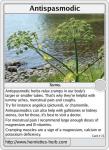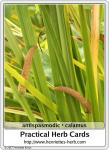
 Antispasmodic herbs relieve cramps. They can be helpful in menstrual pain, gut pain, coughs and gas.
Antispasmodic herbs relieve cramps. They can be helpful in menstrual pain, gut pain, coughs and gas.
They can lessen the pain from gallstones and kidney stones, as they help relax various spasming tubes (like the bile duct, the fallopian tubes, the ureters or the urethra).
Antispasmodics won't help muscle cramps, which almost always are a magnesium deficiency. Sometimes the problem is a calcium a or potassium deficiency. A potassium deficiency is mostly a side effect of medicines. A calcium deficiency can be corrected by taking large enough doses of vitamin D.
Menstrual cramps are a sign of a magnesium deficiency. While herbs can be of help, it's a good idea to take both large enough doses magnesium and a good B complex to address the underlying deficiency. The menstrual cramps won't recur when the deficiency is gone.
I can recommend the root of calamus or the recently dried root of angelica for the very bad menstrual pain that comes with endomestriosis. Chew on a piece of root and the pain is gone.
For gut pain and gas I usually give caraway. Chew on a few seeds. The seeds of other umbellifers work as well: give fennel seed, dill seed, aniseed, angelica seed or cumin seed a try. They all work, so let your choice be dictated by which of them you like.
There are a lot of herbs for coughs. For a productive cough I recommend spicy (warming) herbs like angelica, thyme or sage. For a dry cough I prefer herbs that curb the cough reflex (like California poppy) and herbs that soothe mucous membranes, like mallows.
Henriette's herb cards: buy yours here!

